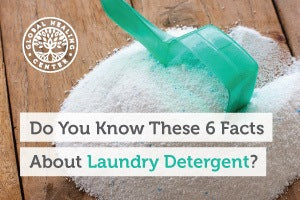Doing the laundry is a simple, straightforward task for most people. However, have you actually thought about the chemicals contained in most laundry detergents? Most of this stuff doesn't wash out in the rinse and can be absorbed into your body through your skin. Knowing what we are putting on our clothes, and in our body, can be incredibly important for protecting our health. Detergents, for example, contain chemicals that can contribute to skin irritation. Not only that, many commercial detergents may mimic hormones and disrupt endocrine function, a problem that influences reproduction, mood, and metabolism.
The Dangers of Laundry Detergent
The following 6 facts about laundry detergent may help you become more aware of the many hazardous ingredients contained in these cleaning agents. These facts may also give you some insight into better options for you and your family.
1. Surfactants Cause Skin Irritation
If you take a close look at the warning label on your favorite laundry detergent, you'll notice that it urges you to avoid direct skin contact. Detergents work by removing oils from clothes, and that includes the natural oils produced by your own skin. Among other uses, our natural oils are necessary for protection against microbes.
Surfactants are the main agents that strip away oils, an action that can seriously irritate the skin and aggravate skin issues. [1] Rashes are common when the skin comes in direct contact with detergents, and some sensitive individuals may break out after wearing clothes that have been washed with conventional surfactant-containing detergents. [2] Respiratory problems may also result from regular exposure to these chemicals. [3]
2. Many are Endocrine Disruptors
In today's world where toxins run wild and the use of man-made chemicals affect practically every area of life, it's no wonder that we're witnessing a surge of hormone-related issues plaguing both women and men. Researchers have found that detergents can disrupt endocrine function and interfere with hormone balance. [4] Many chemicals in common household cleaning products act as xenoestrogens, or synthetic estrogens, which increase the amount of estrogen-like activity in the human body. [5] This can negatively affect fertility in males and increase breast cancer risk in females. [6] [7] Hormone imbalance also contributes to an extensive range of problems including heart disease, depression, and mental impairment. [8] [9]
3. They're Bad for the Environment
After the final rinse, that stuff goes down the drain... into the environment. The effect of laundry detergent on the environment is undeniable, and it’s only within the last few years that we are seeing the toll it’s taking on animal and plant life. Most detergents run into the water supply and have been shown to interfere with aquatic life. This stuff is not natural and many plants and animals cannot process the chemicals contained in these products. Producing and distributing laundry detergent already carries a heavy carbon footprint. Sodium triphosphate and trisodium phosphate can make their way into the water and interfere with sea life development. [10] In fact, phosphates that make their way into the water can increase the growth of toxin-producing algae which can kill plants, fish, dolphins, and other sea creatures. [11]
4. Laundry Pods - A Higher Health Risk for Children
As a result of consumer demand for easy, concentrated forms of laundry detergent, laundry pods have been flooding the market in droves. Convenient? Yes, but they also result in more problems for children than their less-concentrated powder and liquid forms. According to a recent study, children ingest these pods at a higher rate than powdered detergents, and some of the health complaints (digestive distress, breathing difficulties, and lesions) result in ER visits. [12] [13]
5. You Only Need a Little
"Well, these clothes are really dirty, better add extra detergent for good measure." Have you ever said that? Don't. If you put too much detergent into the wash, residue will remain on your clothes. This residue is what leads to skin irritation, rashes, endocrine disruption, and possible respiratory distress. [14]
6. Laundry Detergent Allergies are on the Rise
The stronger the detergent, the harsher the ingredients tend to be. This can create problems for people with sensitive skin or chemical sensitivity. Allergies to products containing harsh chemical ingredients are on the rise, and more and more people are turning to gentler, natural alternatives. Eco-friendly companies are slowly making their way into the detergent market, offering health-conscious users with hypoallergenic, chemical-free options. Not only are natural detergents safer in regards to allergies and skin, they may also be safer for the environment.
Finding an Alternative
Walking around in dirty clothes is obviously not an option, but that doesn't mean a toxic, commercial detergent is the only way. There are gentle products that don't contain all the harsh toxins yet are fantastic for your clothes. What do you use to clean your clothes? Have you, or someone you know, had outbreaks or reactions to harsh detergents? Please leave a comment and share your experience!
Content by





